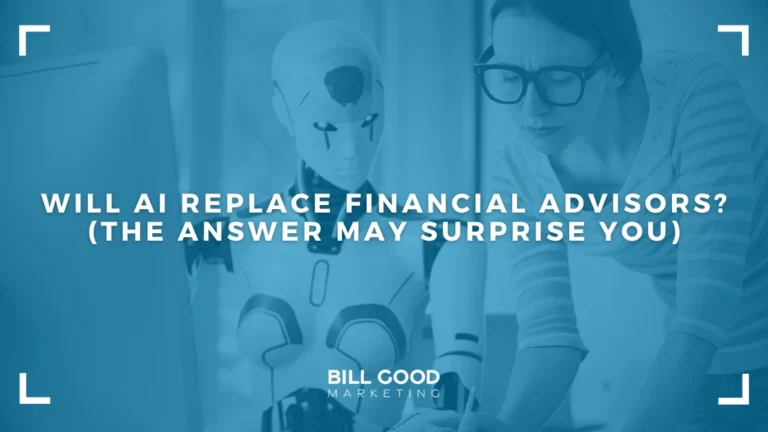There’s a question floating around boardrooms, LinkedIn posts, and conference stages:
“Will AI replace financial advisors?”
Some say yes. They picture robo-advisors and chatbots delivering seamless financial advice, crunching numbers at lightning speed, rebalancing portfolios in real-time, and never needing a coffee break. They point to machine learning, large language models, and AI-powered optimization as proof that the human financial advisor is an endangered species.
Others say no. They argue that wealth management is more than an equation. That financial planning isn’t just about making investment decisions—it’s about understanding people. Their fears. Their ambitions. Their unspoken worries about volatility, estate planning, and financial goals.
Here’s what we know at Bill Good Marketing: Artificial Intelligence (AI) is not the enemy. It’s not coming for you or your colleagues.
But what if — for example — a CFP® practitioner just ignores it?
Should they dismiss AI technology as a passing trend? They might wake up one day and realize they’ve become obsolete—not because AI replaced them, but because they failed to adapt.
This isn’t about AI vs. humans. It’s about AI plus human expertise.
Let’s break it down.

Will Financial Advisors get Replaced by AI?
Artificial Intelligence is a marvel. It’s fast. It’s efficient. It never forgets a filing deadline, never panics during market volatility, and never takes a vacation.
It can analyze a million data points before your morning coffee is finished. It can generate investment strategies that would take a human hours to develop. It can predict trends, optimize asset allocation, and spit out financial advice based on precise risk tolerance metrics.
But here’s the catch:
AI has never had a conversation with a grieving widow who just lost her spouse.
It doesn’t know how to reassure a business owner who is terrified that retirement will make them irrelevant.
It can’t read the hesitation in a client’s voice or understand the financial situation that keeps them up at night.
Even Elon Musk, one of AI’s most outspoken advocates, has admitted its limitations. While he’s investing billions into AI-driven companies like xAI and Tesla’s automation systems, he’s also warned that AI lacks judgment—that without human oversight, it can’t make nuanced decisions.
That’s exactly why AI won’t replace financial advisors.
But it will redefine their role.
AI is a tool. A powerful one. It can handle portfolio management, real-time rebalancing, and AI-powered decision-making. It can provide insights, crunch numbers, and automate what used to take entire back-office teams.
But can it build trust?
Can it coach clients through life’s biggest financial transitions?
Can it read between the lines when a client says, “I am great with high-risk investments” but their eyes say, “I’m scared”?
No. And it never will.
That’s where human financial advisors come in.
The best CFP® practitioners aren’t competing with AI systems. They’re using them.
They’re letting machine learning and generative AI handle the data while they focus on what truly matters: client relationships, financial planning, and human connection.
Artificial Intelligence (AI) can optimize a financial planner’s work. But replace them? Not a chance.
The Human Touch: Why Financial Advisors Are Irreplaceable
Numbers don’t build trust. Algorithms don’t inspire confidence.
A spreadsheet can tell you how much you need for retirement, but it won’t ask how you feel about retiring. A robo-advisor can rebalance a portfolio, but it won’t pause when a client says, “I’m worried about my kids handling this inheritance.”
Clients don’t just need investment advice. They need a guide. A mentor. A steady hand when markets are shaky and financial decisions feel overwhelming.
They need you.

The Power of Human Financial Advisors
AI technology is powerful, but it’s also flawed. It lacks emotional intelligence. It doesn’t understand human biases, even if it can catalogue them. It can’t interpret the panic in a client’s voice when they read a scary headline about a market crash.
A great financial advisor does.
- AI optimizes. Advisors empathize. The best financial advisers don’t just manage assets—they manage emotions.
- AI predicts. Advisors protect. A chatbot can generate an estate plan. A human ensures it aligns with a client’s values, goals, legacy, and then is disseminated to the heirs with education and care.
- AI suggests. Advisors strategize. A machine sees risk tolerance as a percentage. An advisor sees it as a sleepless night before a big financial move.
What Clients Really Pay For
Clients don’t choose an advisor because of their ability to optimize portfolios—that’s table stakes.
They choose advisors because of the human touch. Because when their financial future is on the line, they want human expertise and connection. They need someone to talk them through it. A person with emotions and some connection to their own life experiences. Not just an output from large language models (LLMs).
Because they don’t just want a plan. They want peace of mind.
AI can do a lot.
But it can’t build trust, and trust is what financial planning is built on.
Now, let’s talk about how AI systems and human financial advisors can work together—because the best advisors aren’t rejecting AI. They’re using it.

AI as a Tool, Not a Threat to Financial Advisors
Advisors who are winning today aren’t afraid of AI. They’re using it.
We’ve seen financial advisors integrate AI into their workflows in ways that make them more effective, not less human. Some have used large language models (LLMs) like ChatGPT to refine their LinkedIn strategy, generating post ideas that resonate with their audience and organizing content into a structured campaign.
Others have leveraged AI-powered tools to help document and solidify standard operating procedures (SOPs) for their back-office teams, ensuring consistency and efficiency in their daily operations.
The result?
More time spent on what actually moves the needle—client relationships, financial planning, and human decision-making.
But there’s a limit to how much AI SHOULD do.
We believe that some things require a human touch—and content is one of them. Writing is more than words on a page. It’s more than investment advice or a quarterly newsletter update. Writing is about building trust, creating a connection, and speaking to clients in a way that makes them feel seen and understood.
At Bill Good Marketing, we do not use AI to write our content because we know that great writing is just as much about emotion as it is about information. How often have you read two different passages that explained the same thing, but one came off “feeling” different?
A financial plan is more than numbers. It answers your clients’ top question, “Am I going to be ok?”
A client letter is more than words. It’s a connection with you as their trusted advisor.
The difference between AI-generated text and a well-crafted message from a real human is the same as the difference between a chatbot and a real conversation.
One is functional. The other is meaningful.
What AI Can Do for Financial Advisors
AI is not a gimmick. It’s not a passing trend. It’s a force multiplier—a tool that amplifies what financial advisors can do, not something that replaces them.
AI Handles Complexity at Scale
The days of sifting through spreadsheets and manually analyzing market trends? Gone. AI can process real-time market data, identify investment strategies, and adjust asset allocation based on shifting conditions—faster and with more precision than any human ever could.
It can fine-tune risk tolerance assessments, flag rebalancing opportunities, and handle filings automatically, reducing administrative drag and freeing CFP® practitioners to focus on what really matters: client relationships and financial planning.
AI Powers Smarter Client Interactions
AI isn’t just working in the background. It’s actively shaping the way wealth managers interact with clients. Chatbots and virtual assistants can handle routine questions, ensuring no inquiry goes unanswered, while AI-driven research tools analyze client needs, anticipating concerns before they arise.
Many advisory teams are using AI-driven meeting summaries. That’s a tool that serves as a digital assistant during client meetings. It records the conversation, summarizes it, and logs a list of tasks for each meeting participant.
This isn’t the future. It’s happening right now.
AI is Reshaping Thought Leadership
The best advisors aren’t just managing money—they’re educating, engaging, and leading conversations in their field. AI is helping them do that more efficiently.
With the right inputs, large language models (LLMs) like ChatGPT can help advisors draft social media posts, structure a content strategy, and optimize messaging for engagement. AI tools like Perplexity AI can analyze audience behavior, surface trending topics, and suggest improvements to increase visibility and credibility.
It’s not replacing thought leadership.
It’s giving wealth managers more time to focus on the human side of it.
AI is Here to Stay…and It’s Expanding
By 2027, AI-driven investment tools will become the primary source of personal finance advice for retail investors, with usage projected to hit 80% by 2028, according to Deloitte. That means the shift is already well underway.
This new wave of AI integration isn’t a threat—it’s an opportunity. If you are using it as a tool to provide trusted financial guidance, it will expand access to financial advice, scale expertise, and redefine client interactions in ways that make advisory services more efficient, personalized, and data-driven than ever before.
But for all its power, AI has limits. And that’s where great financial advisors set themselves apart.

What AI Will Never Do
AI can process data. It can predict trends. It can automate tasks. But it will never replace the human experience that sits at the core of great financial advising.
AI Can’t Read Between the Lines
Consider this example. You have had several meetings with a client. You really have started to know what drives them. You also start to notice their body language tells. They are now sitting in front of you with a major financial decision to make. If you were to follow the book (that thing that AI is regurgitating), you would recommend your client follow a perfectly optimized investment strategy, option A.
But, knowing your client, you realize there is a fear in their eyes. There is a concern about their spouse handling things if they are gone. There is that little something that you notice, and therefore, recommend option B. Equally optimized, due to AI-driven research. But this one is a strategy your client will be confident in and stick with.
AI will never pause and ask one of the most important questions of all: “Are you sure?”
AI Lacks Wisdom
Wisdom isn’t just knowledge. It’s knowing the why as well as the what; the when as well as the how.
A machine can read every market report ever published. It can analyze volatility and forecast investment strategies with uncanny precision.
But wisdom comes from experience. From navigating crises. From seeing the patterns that don’t show up in a data set. From helping a client sell their business, not just for the right price, but at the right time for their life.
AI doesn’t have that instinct. And it never will.
AI Doesn’t Build Trust—People Do
A financial advisor is more than a number cruncher. They’re a coach, a strategist, a steady hand in uncertain times.
Clients don’t stick with an advisor for decades because of an algorithm. They stay because of a relationship, a history, a belief that their advisor understands them beyond the spreadsheets.
Trust is not something that can be automated. It’s built one conversation at a time.
AI Won’t Replace Advisors—But Advisors Who Ignore AI Might Be Replaced
The best financial advisers understand this isn’t a zero-sum game.
It’s not AI vs. humans. It’s AI + human expertise.
The advisors who thrive in the next decade will be the ones who let AI systems handle the back-office support, data-heavy analysis, and automation—so they can double down on what makes them irreplaceable: building trust, providing financial guidance, and helping clients make decisions that AI simply can’t.
But they will also recognize that not everything should be automated. That when it comes to connecting with clients, whether in-person or in writing, authenticity wins. AI can help an advisor work smarter, but it should never replace the voice, insight, and relationship-building that define a truly great financial advisor.
This is what separates the top advisors from everyone else.

The Future of Financial Advisory: Adapt or Fall Behind
Every major shift in the financial industry has followed the same pattern.
First, skepticism.
Then, resistance.
Finally, a divide—those who evolve and those who get left behind.
Artificial Intelligence (AI) is no different.
At Bill Good Marketing, we’ve spent decades helping financial advisors navigate change. We watched advisors resist email when it first arrived. We saw them dismiss digital marketing as a passing trend.
And now, we’re seeing some advisors hesitate to embrace AI-powered tools that could make them more efficient, more informed, and more valuable to their clients.
The truth is, AI will not replace financial advisors—but it will reshape the industry.
“Some people call this artificial intelligence, but the reality is this technology will enhance us. So instead of artificial intelligence, I think we’ll augment our intelligence.”
— Ginni Rometty, former CEO of IBM
That’s exactly what the best advisors will do. The advisors who leverage AI to improve decision-making, streamline workflows, and enhance client relationships will lead the next era of financial services. The ones who ignore it? They’ll find themselves struggling to compete with those who embraced the shift.
At the end of the day, clients don’t choose an advisor because of their technology.
They choose an advisor because of their wisdom, insight, and ability to guide them through complex financial decisions.
AI can analyze data, but it can’t build trust.
It can automate processes, but it can’t provide the confidence clients need in uncertain times. The financial advisors who combine AI systems with human expertise will define the future of this industry. The question is: Will you be one of them?
Now is the Time to Take Action
At Bill Good Marketing, we help financial advisors stay ahead of industry shifts, grow their business, and build client relationships that AI can’t replicate.
If you want to future-proof your practice and ensure you’re using technology to advance—not replace—your role as a trusted advisor, let’s talk.
Contact our team today and find out how we can help you stay ahead in the age of AI.
About the Author

Andrew D. White is the Director of Marketing at Bill Good Marketing, a firm with over 45 years of experience helping financial advisors scale their businesses. With deep expertise in advisor marketing, client acquisition, and retention strategies, Andrew specializes in creating high-impact campaigns that drive measurable results. His insights are grounded in real-world experience, working alongside top-performing advisors to refine prospecting, branding, and practice management strategies.




